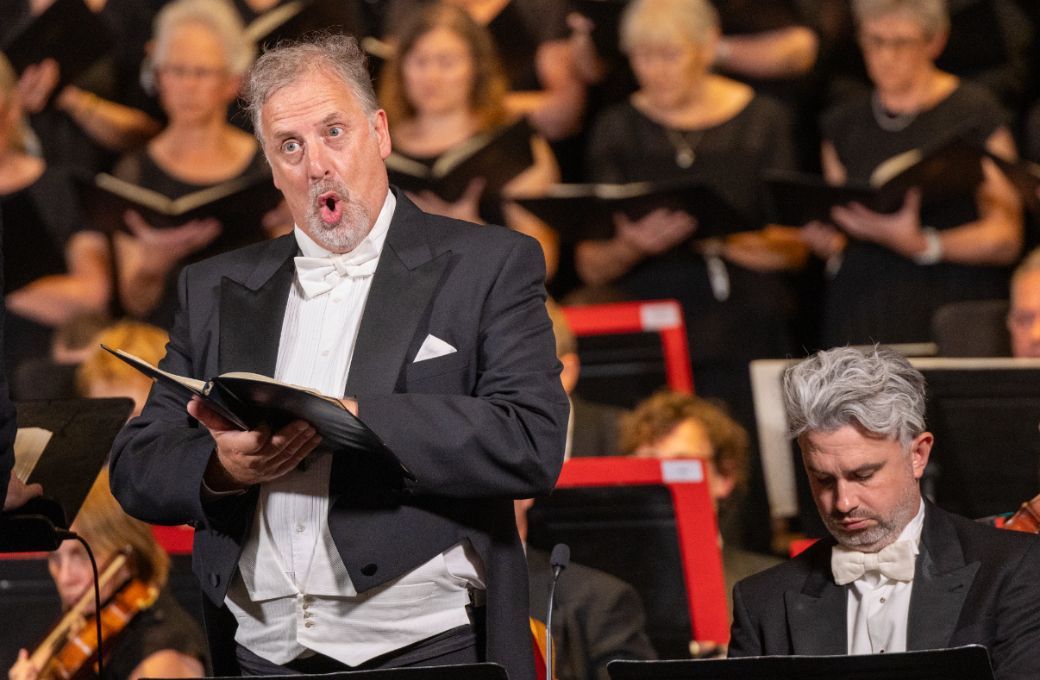It could hardly have been more appropriate that a performance of Elijah – one of the great literary mouthpieces of legend – should have been so emphatically about the voice. That perhaps sounds like a blindingly obvious thing to say of a Three Choirs Festival concert, yet everything about this year’s closing concert reaffirmed not simply the potency of choral singing per se, but of vocal utterance – the power of words – in general.

To a large extent, this was the product of bass-baritone Matthew Brook, who didn’t merely take on the role of Elijah as actively personify him. From his mouth every word had immense weight and meaning, and while he remained stationary his presence was such it felt as if he stalked the stage.
Geraint Bowen provided the context for Brook’s prophetic mission in the clearest possible way, making Part 1 a clear, very satisfying trajectory from desperation to triumph. He also, entirely fittingly, leaned into Mendelssohn’s musical inspirations, tapping into Baroque clarity of line and counterpoint in the overture, managing to cut through Hereford Cathedral’s reverb. But then came the despair, the Festival Chorus a picture of sustained desolation that in due course became active, blood-curdled fear. Their delivery of these anguished sentiments was immediate and impressive, ensuring the work was no mere foregone conclusion but a drama with something real – the souls of people – at stake.
In contrast to this came a pronounced warmth from tenor Anthony Gregory, who in his stalwart portrayal of Obadiah lingered on words to convey additional tenderness. The effect was necessarily slow but profound, with Brook’s authoritative Elijah injecting a stentorian form of positivity into the mix. In his efforts he was superbly backed up by the Philharmonia, Bowen eliciting firm accents from them to reinforce his words. This turned more dramatic in the unsettling brass presence when Elijah raises the boy from the dead, answered by more warmth from comforting strings in the aftermath.
It's to the eternal credit of both Mendelssohn and his librettist Julius Schubring that they chose to include one of the funniest sections in the Bible, Elijah’s contest with the priests of Baal. Brook had much more than just a glint in his eye here, revelling in the prophet’s sarcastic zeal, while Bowen whipped up the chorus into an ever more desperate frenzy in their punchy, imploring refrain, “hear and answer!”.
The most telling part of the performance came in Part 2. Contralto Jess Dandy, hitherto hard to make out, was evidently born to play Queen Jezebel. Her words were a striking and significant counterpoint to that of Elijah’s, in the process proving again how often the devil has the best tunes, causing the chorus to erupt with such fiery, antagonistic energy it made the earlier tone of divine triumph a distant memory. In the wake of this, Brook’s account of the aria “It is enough! O Lord, now take away my life” could not have been more apt or moving, with distinct echoes of Bach’s “Es ist vollbracht” in the orchestral colour and pacing. Bowen made these subsequent passages fittingly spare and intimate, while Brook articulated a superb mixture of adamance, confusion and dejection.
It was a necessary period of both musical and emotional reflection before the work’s resurgent climax. This was triggered by the chorus, whose response to the earthquake, wind, fire and “still small voice” was so animated that energy flooded back into the music. Bowen gave the monumental final swell of glory some final hints of zealous swagger that perhaps even Elijah himself would not have disapproved of.


